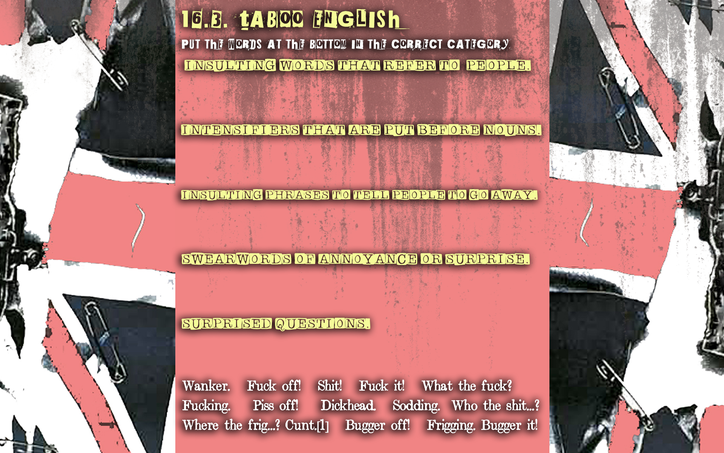Welcome back to the second section of how to understand and use bad language in a natural and convincing way. Find out if someone is insulting you.
This is part of our English language and British cultural course. (Free non-profit course by Libertarian Linguistics).
Divide the words below into their appropriate groups to discover how much you know about English.

How to understand and use the word 'Bitch' correctly.
Bitch (noun) You will notice that this word has been put into the mild (not strong) section of swearwords. This is because it is one of the most misunderstood swearwords in the world of English as a second language. It is, of course, offensive. The literal meaning is a female dog. This word doesn’t, like some dictionaries say, mean prostitute or whore. It is essentially, a female swearword, used by women to talk about other women. If usually means a woman who talks badly about other people, although natives use it, sometimes, to refer to men.
Thus ‘a bitchy comment’ (adj.) would be to say a rude remark about someone else. In similar context, it can mean simply ‘to moan’. ‘He’s always bitching about how little they pay him.’ As a noun, the other meaning is ‘a hard, difficult situation.’ ‘Life’s a bitch, and then you die.’ It should be mentioned that phonetically it is often confused with ‘beach’, and is probably best to avoid.
Son of a bitch (pronounced as one word) is another American swearword that isn’t as strong as it is when translated into other languages. Can you imagine the president of your country using a similar word in your language? Well US president Franklin D. Roosevelt used it in public speeches to talk about the Nicaraguan dictator Somoza; He may be a son of a bitch, but he’s our son of a bitch.
We have the best, highest quality English learning materials on the internet. Check this out:
Which swearwords can be used without offending?
[Naff off (verb) an old, slightly out-of-date swearword, that could be described as mild, or inoffensive. Interestingly, it has been ‘adopted’ by the BBC, as a socially acceptable euphemism for more offensive insults like f*ck off or p*ss off, which are considered too strong for evening or daytime television.
Naff off can be commonly heard in prison scenes in soap-operas, or when the characters need to use more colourful language. As you have probably noticed, most phrasal verbs ending in ‘off’ in their imperative form, are swearwords.
Many other inoffensive verbs exist too. Clear off is another alternative, which means little more than ‘go away’. Even children have their own milder swearwords like buzz off or flip off.

MORE ENGLISH LANGUAGE LESSONS COMING TOMORROW! SHARE!!!!!!!!!!!!

